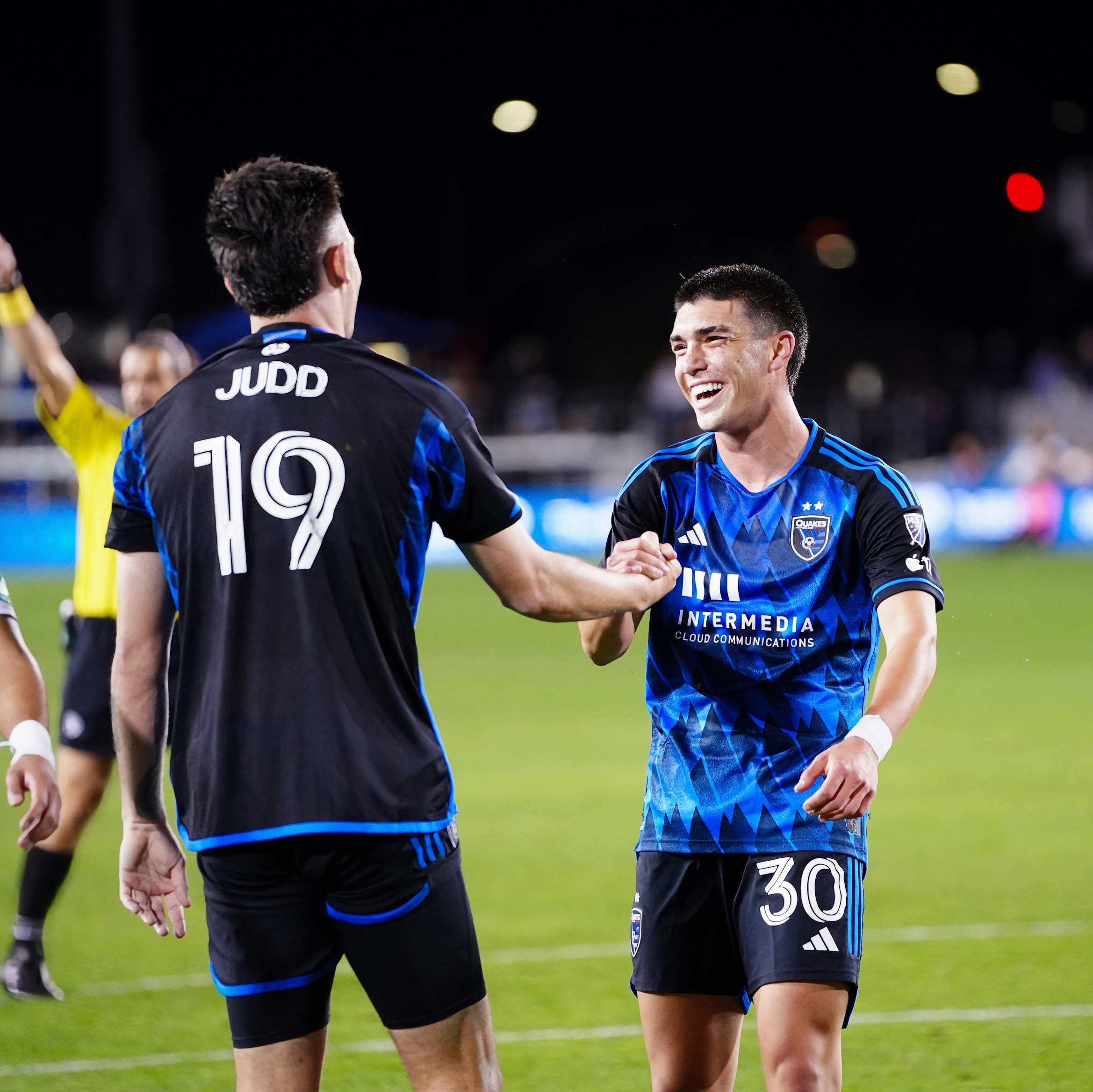March 23, 2024 – The San Jose Earthquakes are all smiles, including midfielder Niko Tsakiris and forward Preston Judd (pictured), as the team defeated the Seattle Sounders 3 to 2 at PayPal Park. Photo credit: Sara Leyva of Sara Nicole Mindful Photography for Quakes Epicenter.
A week ago, the Quakes were on a four-game losing streak to start their season, and I published a fairly dire assessment of what was going wrong.
With a (mostly) convincing win against the Sounders at the weekend, though, what exactly changed? Did anything change? I’ll evaluate a few factors below, and give a rating for how likely those changes are to persist:
Luck finally came back around
After noting in my previous piece that the Quakes were suffering through a period of unusually bad luck in terms of xG, that reverted toward the mean somewhat against Seattle. Excluding penalties, San Jose managed 3 goals on 2.23 xG, and Seattle managed 1 on 0.66 xG, both a bit above expectation but to similar minor degrees. Essentially, no “luck” benefit either way.
Another type of luck is that which isn’t picked up by xG, precisely: being on the wrong end of one of the very worst refereeing decisions you’ll see (although World Cup referee Mark Geiger apparently didn’t share my view from the VAR seat). That penalty decision alone essentially gifted Seattle 0.8 xG in and of itself, and Raul Ruidiaz duly converted. That’s bad luck.
Durability of change: Pretty high! The Quakes didn’t need “good” luck to make up for “bad” luck, which is just a version of the Gambler’s Fallacy. They just needed luck to go back to relatively neutral to become a respectable team, and it did. Plus, with PRO finally coming to a labor agreement, we should get better referees back, so theoretically there will be lower risk for bad refereeing luck.
The personnel got better, for a variety of reasons
Niko Tsakiris is awesome. We’ve been waiting on his return for a while, and that anticipation was rewarded. Not only is he a talented player in his own right, perhaps the most important thing he brings is the ability for the team to play the way Luchi would like to, and made the entire midfield network around him look better. It’s hard to believe he’s just 18 years old still, given how much confidence and game-awareness he shows. He didn’t actually have a spectacular game, necessarily, but his presence clearly improved the squad.
Other than that, there were a few regular starters dropped for their backups, but the reason was different for each. Alfredo Morales started in place of Carlos Gruezo, who simply wasn’t available due to international duty. Benji Kikanovic started in place of Amahl Pellegrino, who didn’t even make the gameday squad, for reasons that remain unclear. Preston Judd was simply selected ahead of Jeremy Ebobisse at the 9.
The net of those changes? Excellent, all around. Morales played better than Gruezo has at any point this year, providing much more value in possession than the Ecuadoran. Kikanovic was much more involved in the play on both sides of the ball than Pellegrino had been in recent weeks. Judd was actually fairly quiet but had a few dangerous looks at goal, while Ebobisse, replacing him off the bench, scored a quintessential Ebobbise goal: finishing off a move he himself unlocked through back-to-goal work. More than individual performances, the collective cohesion was dramatically improved on before, with the midfield making more sense than I’ve seen in almost a year from a Luchi side.
I also see it as a highly encouraging sign that Luchi was willing to drop an underperforming top-line player (Ebobisse) for his backup who makes 10x less (Judd), and I’m saying that as a guy who likes Ebobisse. Gruezo, on a DP salary, was dropped last year in favor of then-17-year-old Tsakiris. While we don’t know precisely why Pellegrino was dropped, it’s possible that performance played a role in it, too.
Adhering to strict meritocracy is not just better for the player who is dropped himself, by providing a level of accountability regardless of salary, it actually is essential to setting a winning culture across the entire squad. Highly paid players tend to be resented if they retain their spots despite poor performances, and squad players feel like putting in effort won’t be rewarded.
Durability: Medium. It will be a tougher job for Luchi to remain ruthlessly meritocratic once Gruezo is available for selection again, but I have faith he’ll stick with it. As for health? Well, you can never count on health. But Niko has only been available for 20% of games thus far, and I bet he plays more than 20% of the games from here on out.
The Sounders are bad
Seattle definitely isn’t good. They are third from the bottom in the west, were very much not at full strength last weekend, and have middling xGD numbers. Seattle fans/writers certainly don’t have a particularly high opinion of this year’s team. So it’s probably not wise to over-interpret the win as a sign of excellence.
That being said, the xG stats on the Sounders actually paint them as more of a mid-table team than a basement dweller, particularly if you only consider what they’ve done against their non-SJ opponents. And I don’t think any team in MLS is so bad that a win lacks meaning; there’s just too much parity.
Durability: Fairly low. Most Quakes opponents through the year will be better than Seattle, and you can’t count on catching teams when they’re not at full strength. Plus, it was not a fully dominant performance: Seattle managed 60% possession as visitors, and looked dangerous in spots.
Conclusion
This performance should straighten out some of the bad vibes, and give confidence that San Jose is not inexorably headed toward that wooden spoon. But given the state Seattle is in, and the fact that luck (or health) can turn in an instant, I still think the Quakes aren’t fundamentally strong enough to count on as a playoff team.
That of course leads us back to the big picture problems discussed last week: making sure that the quality available to Luchi is good enough that they can seriously contend. I will just remind everyone that the Quakes:
- Have not had a winning season in the last 10 years
- Have only spent one of those 10 seasons in the top half of MLS spenders by salary (2016)
- Are ranked 28th out of 29 MLS clubs in terms of highest transfer fee ever paid
- Had 13 different MLS clubs make transfers larger than their record transfer just this offseason
- In all likelihood rank as a bottom-three team in salary spending (to be confirmed when MLSPA puts out its spring salary report)
- Currently have one DP slot and all three U-22 slots empty (you know, the parts of the roster where the spending comes primarily from the owner’s pocket rather than MLS allocation)
If the money is made available to get more aggressive with those available slots, that will provide the quality to more reliably win those games Luchi should win, and to be more competitive against the likes of the revitalized LA Galaxy. This team isn’t worlds away from being decent, and there aren’t gaping holes all over the place, but their current level of quality provides too little margin for error. You need to add some star power.
Essentially, the Quakes are the SF Giants of a month or two ago, who didn’t look like they were going much of anywhere. Add the equivalent of Matt Chapman and Blake Snell, and all of a sudden possibilities start opening up.




